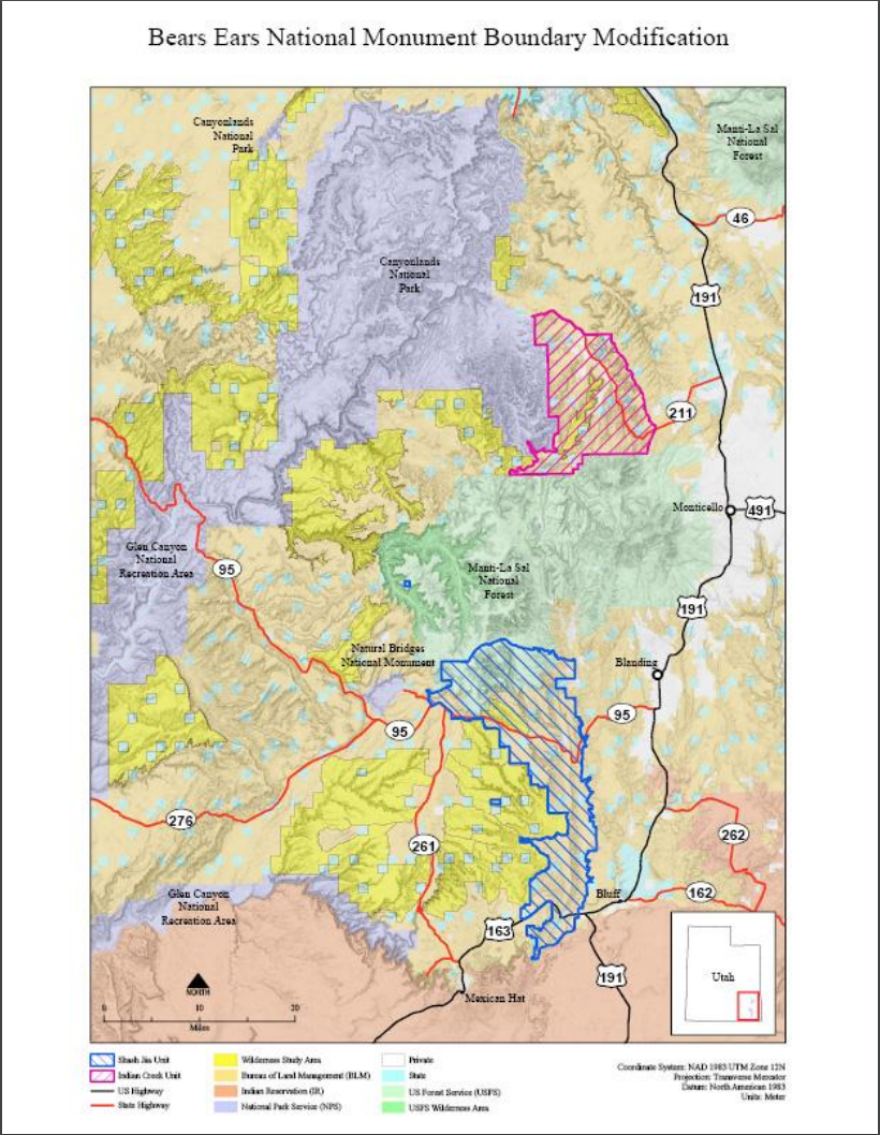President Donald Trump’s orders to scale down two national monuments in southern Utah was widely anticipated by residents there.
A lot of landscape shifted yesterday in the old battle over Utah’s public lands. Some of it was emotional, like the relief San Juan County residents talked about at the Hideout Community Center.
The smell of fresh-popped popcorn, iced sugar cookies, the balloons, little kids playing — it was festive. People here felt abused when former President Barack Obama declared the Bears Ears National Monument last year. But today, they’re gathered here to watch Trump undo it.
“The president heard our voices,” says Brooke Pehrson, who’s lived in Blanding almost all her life. A homemaker and photographer, she’s come to watch the speech with friends.
“And our senators have worked really hard,” she says. “Our commissioners have worked really hard to not let this be swept under the bus and let it just happen to us. I’m grateful for that fight. I’m grateful for what’s being done on our behalf. It’s what America’s all about.”
Trump’s being live-streamed now on a big screen in front of the room, thanks to a Salt Lake TV station.
About 50 people at viewing party in @sanjuancounty seat. And popcorn! pic.twitter.com/jJOu6dZh0w
— Judy Fahys (@judyfutah) December 4, 2017
“The local communities that knows the land the best and that cherishes the land the most,” the president says, hitting all of the right notes with the Monticello crowd.
“That was exciting,” says Pehrson. “That was — I feel like he really is for the people, and he has heard us. So, it’s — we’re grateful, just totally grateful.”
It's a celebration all the time. Just being able to feel like we have the freedoms to do what, to do exactly what he said: hunting, camping, hiking - all the things we've grown up doing. It's a celebration in itself just getting to look forward to that.
A billboard just outside Blanding says: #RescindBearsEars. Eliminating the monument is what many locals originally asked for. But they’ll settle for the shrunken footprint Trump’s just ordered.
Instead of one monument with 1.35 million acres, there will be two totaling around 200,000 acres. That means more public land where you can cut wood and drive in the backcountry. That’s the kind of freedom people have always enjoyed on the federal lands here.
“So happy,” says Nicole Francom, who also loved Trump’s speech. “I feel our voices down here were heard. And, when he was talking I felt like he really understood where we were coming from and what we felt like we were missing. It was wonderful.”
I asked them if they’d celebrate the president’s decision.
“It’s a celebration all the time,” says Pehrson, “just being able to feel like we have the freedoms to do what, to do exactly what he said: hunting, camping, hiking — all the things we’ve grown up doing. It’s a celebration in itself just getting to look forward to that.”
But, for other people in southern Utah, smaller monuments are a big disappointment.
Native Americans consider Bears Ears sacred. Graves and ancestral artifacts are everywhere, and they still gather herbs and practice ceremonies there.

“It’s just a, a tough day,” says Regina Lopez Whiteskunk, who fought hard for Bears Ears as co-chair of a five-tribe coalition.
On Monday, Whiteskunk wanted to be with other people from local tribes, protesting alongside environmentalists Monday at the State Capitol. But she had car trouble and never made it there. Instead, she fielded calls from friends.
“It was rather disturbing because I was holding back the tears,” she says, “and it’s just hard for me not to be emotional because it’s hard not to take it personal.”
Trump’s proclamation puts a San Juan County Commissioner on the Bears Ears Commission. And the name Bears Ears changes to the Navajo, Shash Jaa. It’s actually a kind of a jab at the rest of the tribal coalition behind the monument: the Hopi, the Zuni, the Ute Mountain Utes and the Ute Indian tribe.
Nathan Waggoner of Escalante is also disappointed. The presidential proclamation slices the acreage of the Grand Staircase Escalante National Monument in half. Then it cuts the remaining acreage into three units.
“You know, we've been anticipating this for a while,” he says. “And so we, you know, we kind of knew what to look for and listen for.”

Waggoner says in the 21 years since former President Bill Clinton
created the monument the economy’s changed in Escalante. The open spaces and the area’s rich paleontology and geology — 1.9 million acres — became a draw for new people and businesses. His own family business has grown to include lodging, a restaurant, an outdoor store and a backcountry guide service.
Waggoner says lots of locals have seen their future in the monument. But now that’s threatened by the Trump proclamation.
“It's not about giving back to the little guy,” he says. “It's about taking from everybody. And they really tried to put a lot of emphasis on kind of bringing in a certain kind of industry that they wanted: Coal. An industry that wasn't going — economically it wasn’t going to make sense. And, in doing so, they're taking away the very thing that we, that we've built.”
Supporters are calling the Trump plans for the monument a way to bring certainty to rural southern Utah. But really, there’s still a lot of uncertainty.
One reason is that some of the changes are in Congress’ hands, like soliciting local input and setting up the new tribal commission.
Another complication is lawsuits. Conservation groups and Native American advocates filed several within just hours of Trump’s announcement. And getting decisions on them could take years.
Editor's Note: This story was updated 12/12/17 to correct the composition of the tribal advisory commission under the new presidential order.





